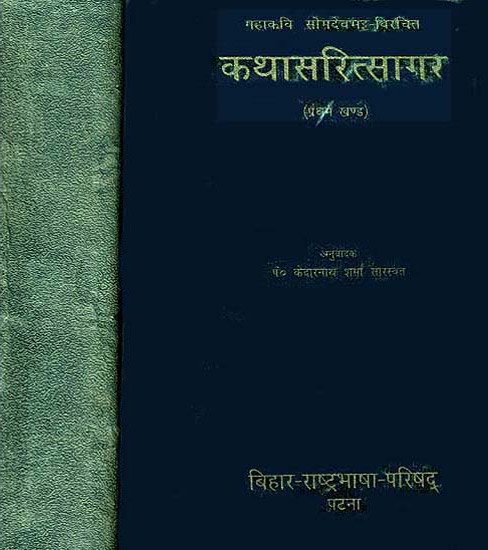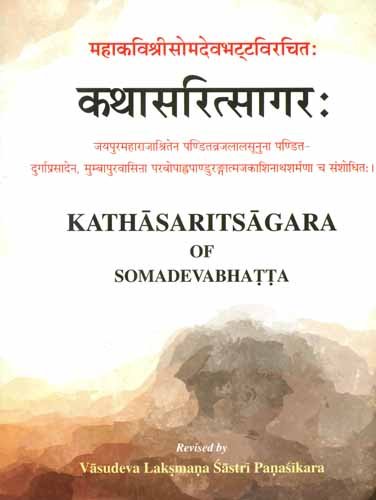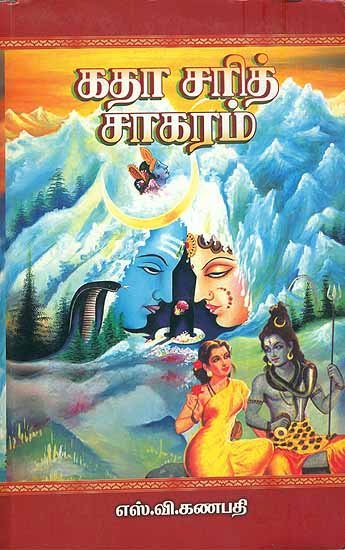Kathasaritsagara [sanskrit]
by C. H. Tawney | 2014 | 226,424 words | ISBN-13: 9789350501351
The Sanskrit edition of the Kathasaritsagara referencing the English translation and grammatical analysis. Written by Somadeva and dating from the 12th century, the Kathasaritsagara (or Katha-sarit-sagara) represents an epic legend narrating the adventures of Naravahanadatta as he strives to become the destined emperor of the Vidyadharas. Alternative titles: (Kathāsaritsāgara, कथासरित्सागर, Kathā-sarit-sāgara)
Verse 8.1.160
तद्युक्तेन सुतेन तेन सह तत्सूर्यप्रभेणोद्यमो युष्माभिः क्रियताम् अनर्गलम् इहाप्यस्मद्गृहाभ्यागमे ।
यावत्तां परलोकतः पुनर् इव प्रत्यागतामात्मजां पश्यामश् च विवाहकार्यमधुना कुर्मश् च तस्या वयम् ॥ १६० ॥
tadyuktena sutena tena saha tatsūryaprabheṇodyamo yuṣmābhiḥ kriyatām anargalam ihāpyasmadgṛhābhyāgame |
yāvattāṃ paralokataḥ punar iva pratyāgatāmātmajāṃ paśyāmaś ca vivāhakāryamadhunā kurmaś ca tasyā vayam || 160 ||
The English translation of Kathasaritsagara Verse 8.1.160 is contained in the book The Ocean of Story by C.H. Tawney. This book is available online or you could buy the latest edition:
Read online Buy now! The English translation by C.H. Tawney (2014)
Glossary of Sanskrit terms
Note: This extracts Sanskrit terms and links to English definitions from the glossary, based on an experimental segmentation of verse (8.1.160). Some terms could be superfluous while some might not be mentioned. Click on the word to show English definitions.
Tad, Tat, Yukta, Suta, Tena, Saha, Suryaprabha, Udyama, Yushmad, Kriyat, Anargala, Iha, Api, Apya, Asmad, Grih, Griha, Abhyagama, Yavat, Paraloka, Tas, Punar, Iva, Pratyagata, Atmaja, Pashya, Vivaha, Karya, Adhuna, Vaya,
Analysis of Sanskrit grammar
Note: this is an experimental feature and only shows the first possible analysis of the Sanskrit text (Kathasaritsagara Verse 8.1.160). If the system was successful in segmenting the sentence, you will see of which words it is made up of, generally consisting of Nouns, Pronouns, Verbs, Participles and Indeclinables. Click on the link to show all possible derivations of the word.
- Line 1: “tadyuktena sutena tena saha tatsūryaprabheṇodyamo yuṣmābhiḥ kriyatām anargalam ihāpyasmadgṛhābhyāgame ”
- tad -
-
tad (indeclinable)[indeclinable]tad (indeclinable adverb)[indeclinable adverb]tat (indeclinable correlative)[indeclinable correlative]tad (noun, neuter)[compound], [nominative single], [accusative single]
- yuktena -
-
yukta (noun, masculine)[instrumental single]yukta (noun, neuter)[instrumental single]√yuj -> yukta (participle, masculine)[instrumental single from √yuj class 7 verb]√yuj -> yukta (participle, neuter)[instrumental single from √yuj class 7 verb]
- sutena -
-
suta (noun, masculine)[instrumental single]suta (noun, neuter)[instrumental single]√su -> suta (participle, masculine)[instrumental single from √su class 5 verb]√su -> suta (participle, neuter)[instrumental single from √su class 5 verb]√sū -> suta (participle, masculine)[instrumental single from √sū class 6 verb]√sū -> suta (participle, neuter)[instrumental single from √sū class 6 verb]√sū -> suta (participle, masculine)[instrumental single from √sū class 2 verb]√sū -> suta (participle, neuter)[instrumental single from √sū class 2 verb]
- tena -
-
tena (noun, masculine)[compound], [vocative single]ta (noun, masculine)[instrumental single]ta (noun, neuter)[instrumental single]tad (noun, neuter)[instrumental single]sa (noun, masculine)[instrumental single]√tan (verb class 8)[perfect active second plural]√tan (verb class 4)[perfect active second plural]√tan (verb class 1)[perfect active second plural]
- saha -
-
saha (indeclinable postposition)[indeclinable postposition]saha (noun, masculine)[compound], [vocative single]saha (noun, neuter)[compound], [vocative single]√sah (verb class 1)[imperative active second single]
- tat -
-
tat (indeclinable correlative)[indeclinable correlative]tad (noun, neuter)[compound], [nominative single], [accusative single]
- sūryaprabheṇo -
-
sūryaprabha (noun, masculine)[instrumental single]sūryaprabha (noun, neuter)[instrumental single]
- udyamo* -
-
udyama (noun, masculine)[nominative single]
- yuṣmābhiḥ -
-
yuṣmad (pronoun, none)[instrumental plural]
- kriyatām -
-
√kṛ -> kriyat (participle, masculine)[genitive plural from √kṛ class 6 verb]√kṛ -> kriyat (participle, neuter)[genitive plural from √kṛ class 6 verb]√kṛ (verb class 1)[imperative passive third single]√kṛ (verb class 2)[imperative passive third single]√kṛ (verb class 5)[imperative passive third single]√kṛ (verb class 8)[imperative passive third single]√kṛ (verb class 3)[imperative passive third single]√kṛ (verb class 6)[imperative active third dual], [imperative middle third single], [imperative passive third single]
- anargalam -
-
anargala (noun, masculine)[adverb], [accusative single]anargala (noun, neuter)[adverb], [nominative single], [accusative single]anargalā (noun, feminine)[adverb]
- ihā -
-
iha (indeclinable adverb)[indeclinable adverb]iha (indeclinable)[indeclinable]
- apya -
-
api (indeclinable preposition)[indeclinable preposition]apya (noun, masculine)[compound], [vocative single]ap (noun, neuter)[nominative dual], [vocative dual], [accusative dual], [locative single]
- asmad -
-
asmad (pronoun, none)[ablative plural]
- gṛhā -
-
gṛha (noun, masculine)[compound]gṛh (noun, masculine)[instrumental single]gṛh (noun, neuter)[instrumental single]gṛhā (noun, feminine)[nominative single]
- abhyāgame -
-
abhyāgama (noun, masculine)[locative single]
- Line 2: “yāvattāṃ paralokataḥ punar iva pratyāgatāmātmajāṃ paśyāmaś ca vivāhakāryamadhunā kurmaś ca tasyā vayam ”
- yāvat -
-
yāvat (indeclinable)[indeclinable]yāvat (indeclinable relative)[indeclinable relative]yāvat (noun, masculine)[compound]yāvat (noun, neuter)[nominative single], [vocative single], [accusative single]
- tām -
-
tā (noun, feminine)[accusative single]sā (noun, feminine)[accusative single]
- paraloka -
-
paraloka (noun, masculine)[compound], [vocative single]
- taḥ -
-
tas (noun, masculine)[compound], [vocative single]tas (noun, neuter)[compound], [nominative single], [vocative single], [accusative single]ta (noun, masculine)[nominative single]
- punar -
-
punar (indeclinable adverb)[indeclinable adverb]punar (indeclinable)[indeclinable]
- iva -
-
iva (indeclinable adverb)[indeclinable adverb]iva (indeclinable)[indeclinable]
- pratyāgatām -
-
pratyāgatā (noun, feminine)[accusative single]
- ātmajām -
-
ātmajā (noun, feminine)[accusative single]
- paśyām -
-
paśyā (noun, feminine)[accusative single]√paś -> paśyā (participle, feminine)[accusative single from √paś class 10 verb]
- aś -
-
a (noun, masculine)[nominative single]ṛ (noun, feminine)[vocative single]ṛ (noun, masculine)[vocative single]
- ca -
-
ca (indeclinable conjunction)[indeclinable conjunction]ca (noun, masculine)[compound], [vocative single]ca (noun, neuter)[compound], [vocative single]
- vivāha -
-
vivāha (noun, masculine)[compound], [vocative single]vivāha (noun, neuter)[compound], [vocative single]
- kāryam -
-
kārya (noun, masculine)[adverb], [accusative single]kārya (noun, neuter)[adverb], [nominative single], [accusative single]kāryā (noun, feminine)[adverb]√kṛ -> kārya (participle, masculine)[adverb from √kṛ]√kṛ -> kārya (participle, neuter)[adverb from √kṛ]√kṛ -> kāryā (participle, feminine)[adverb from √kṛ]√kṛ -> kārya (participle, masculine)[accusative single from √kṛ class 1 verb], [accusative single from √kṛ class 2 verb], [accusative single from √kṛ class 5 verb], [accusative single from √kṛ class 8 verb], [accusative single from √kṛ]√kṛ -> kārya (participle, neuter)[nominative single from √kṛ class 1 verb], [accusative single from √kṛ class 1 verb], [nominative single from √kṛ class 2 verb], [accusative single from √kṛ class 2 verb], [nominative single from √kṛ class 5 verb], [accusative single from √kṛ class 5 verb], [nominative single from √kṛ class 8 verb], [accusative single from √kṛ class 8 verb], [nominative single from √kṛ], [accusative single from √kṛ]√kṛ -> kārya (participle, masculine)[accusative single from √kṛ class 3 verb], [accusative single from √kṛ class 6 verb]√kṛ -> kārya (participle, neuter)[nominative single from √kṛ class 3 verb], [accusative single from √kṛ class 3 verb], [nominative single from √kṛ class 6 verb], [accusative single from √kṛ class 6 verb]√kṝ -> kārya (participle, masculine)[accusative single from √kṝ class 5 verb], [accusative single from √kṝ class 9 verb]√kṝ -> kārya (participle, neuter)[nominative single from √kṝ class 5 verb], [accusative single from √kṝ class 5 verb], [nominative single from √kṝ class 9 verb], [accusative single from √kṝ class 9 verb]
- adhunā -
-
adhunā (indeclinable)[indeclinable]
- kurmaś -
-
√kṛ (verb class 8)[present active first plural]
- ca -
-
ca (indeclinable conjunction)[indeclinable conjunction]ca (noun, masculine)[compound], [vocative single]ca (noun, neuter)[compound], [vocative single]
- tasyā* -
-
sā (noun, feminine)[ablative single], [genitive single]
- vayam -
-
vaya (noun, masculine)[adverb], [accusative single]vayā (noun, feminine)[adverb]asmad (pronoun, none)[nominative dual]
Other editions:
Also see the following editions of the Sanskrit text or (alternative) English translations of the Kathasaritsagara Verse 8.1.160
Kathasaritsagar
by Kedarnath Sharma Saraswat (2005)
The Only Edition with the Sanskrit Text and its Hindi Translation (An Old and Rare Book) Set of 3 Vol.
Buy now!
Kathasaritsagara of Somadeva Bhatta (Sanskrit Text Only)
by Vasudeva Laksmana Sastri (2013)
Katha Sarit Sagar in Marathi
by H. A Bhave (1995)
Set of 5 Volumes; Published by Varada Books, Pune. 2256 pages (Throughout B/W Illustrations).
Buy now!
Katha Sarit Sagara (Tamil)
by S. V. Ganapati (எஸ். வி. கணபதி) (2014)
[கதா சரித் சாகரம்] Published by Alliance Publications.
Buy now!
Galpa Shono
by Abhijit Chattopadhyay (2014)
[গল্প শোনো] Galpa Shono: Bengali Translation of 'Suno Kahani From Katha Sarit Sagar'; 9788126015436; Published by Sahitya Akademi, Delhi.
Buy now!Preview of verse 8.1.160 in Bengali sript:
তদ্যুক্তেন সুতেন তেন সহ তত্সূর্যপ্রভেণোদ্যমো যুষ্মাভিঃ ক্রিযতাম্ অনর্গলম্ ইহাপ্যস্মদ্গৃহাভ্যাগমে ।
যাবত্তাং পরলোকতঃ পুনর্ ইব প্রত্যাগতামাত্মজাং পশ্যামশ্ চ বিবাহকার্যমধুনা কুর্মশ্ চ তস্যা বযম্ ॥ ১৬০ ॥
![Kathasaritsagara [sanskrit] - book cover](/uploads/a/Katha-Sarit-Sagara.jpg)




